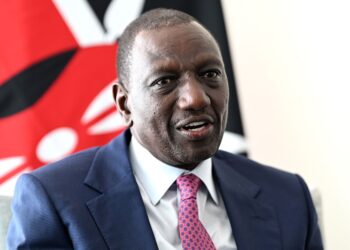President Donald Trump announced on October 1, 2025, that the U.S. will end Kenya-Somalia military funding commitments, redirecting resources to secure American borders instead of “wasting time” abroad.
Speaking to top military brass at the Pentagon, Trump declared, “We will now defend our own borders instead of wasting time in Kenya or Somalia,” signalling a sharp shift in foreign policy that could cut billions in aid to East Africa.
The move has stunned allies and raised alarms over regional stability as part of a broader $5 billion foreign aid cut proposed in August.
Trump’s remarks came during a closed-door briefing with the Joint Chiefs, where he questioned the value of U.S. missions in “far-flung places” like Kenya and Somalia.
For years, Washington has poured resources into counterterrorism efforts, including training Kenyan forces against al-Shabaab and supporting Somalia’s fragile government. Annual military aid to Kenya hovers around $60 million, while Somalia receives over $200 million for special operations.
Trump’s decision to halt this funding aligns with his “America First” doctrine, revived since his January inauguration. Kenyan officials reacted swiftly, with Foreign Affairs CS Korir Sing’oei calling the cuts “a betrayal of shared security interests.” Kenya, a key U.S. partner in the Horn of Africa, hosts American troops at Camp Simba and contributes to multinational missions in Somalia.
The funding freeze could jeopardise these operations, potentially emboldening extremist groups. “This isn’t just about money; it’s about lives,” Sing’oei told reporters in Nairobi, as markets dipped on news of the policy shift. In Somalia, the impact looms larger. U.S. stipends to elite Danab commandos stopped earlier this year, already straining the fight against al-Shabaab.
President Hassan Sheikh Mohamud warned that a “full withdrawal” could lead to a “security vacuum”, echoing concerns from aid groups about rising insurgent attacks.
Human rights advocates, including Amnesty International, fear the cuts will exacerbate humanitarian crises, with Somalia facing famine risks amid ongoing conflict. Trump’s broader aid overhaul, detailed in a White House rescission package, targets “woke and wasteful” programs, including those in Africa.
The Supreme Court upheld a similar $5 billion freeze in September, handing Trump a legal win despite Democratic outcry.
Critics, like Senate Minority Leader Chuck Schumer, label it “reckless isolationism”, arguing it weakens U.S. global influence. Supporters, including GOP hawks, praise the refocus on domestic priorities like border walls and veteran care.
Donald Trump: We will now defend our own borders instead of wasting time in Kenya or Somalia.pic.twitter.com/JX6o1cVzaX
— Chris Sambu (@the_sambu) October 1, 2025
The policy ripple extends to Kenya’s role in Haiti, where Nairobi pledged 1,000 police for a UN mission backed by U.S. funds. Uncertainty now clouds that commitment, with Trump signalling no more “policing” abroad.
Economists warn of knock-on effects:Reduced aid could slow Kenya’s GDP growth, projected at 5.2% for 2025, hitting sectors like agriculture and tourism. On Capitol Hill, bipartisan pushback brews.
A House resolution, led by Rep. Ilhan Omar, demands a review of the cuts’ terrorism implications. Meanwhile, Trump’s base cheers the savings, with online polls showing 62% approval for slashing overseas spending.
As East African leaders convene an emergency summit in Addis Ababa, questions mount: Will Europe step up? Or will this mark the end of post-9/11 partnerships?
Trump’s gamble raises the question of whether Fortress America can afford to retreat, abandoning its allies in unstable regions. For ordinary Kenyans and Somalis, the stakes are immediate. Fishermen near Manda Bay, reliant on U.S.-trained rangers, fear pirate resurgence.















